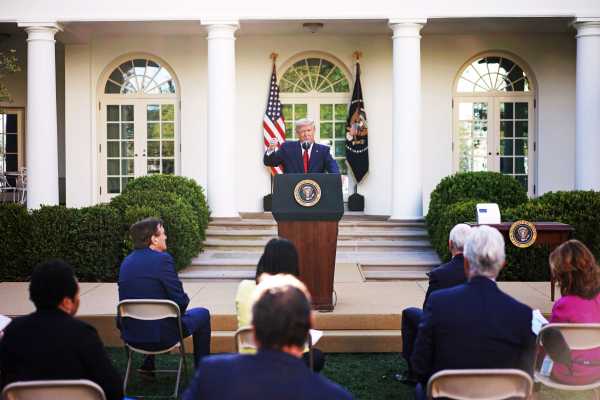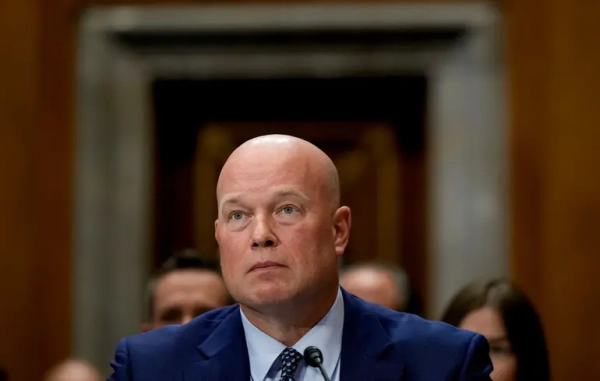
Governors and public health officials — including those on President Donald Trump’s coronavirus task force — have spoken often about difficulties finding and processing Covid-19 tests. In a call with governors Monday, however, Trump said he has not heard about these issues.
In audio of the call published by CBS News, Montana Gov. Steve Bullock (D) details two problems with testing. First, that his state doesn’t have enough tests, saying “we’re one day away if we don’t get test kits from the CDC that we wouldn’t be able to do testing.” And second, that the federal government has depleted the tests available on the private market.
These are known issues, and are problems the Trump administration has been repeatedly criticized for not working harder to solve. But Trump respond to Bullock’s concerns by saying, “I haven’t heard about testing in weeks. We’ve tested more now than any nation in the world. We’ve got these great tests, and we’ll come out with another one tomorrow, that’s almost instantaneous testing. But I haven’t heard about testing being a problem.”
It is true that testing capacity has ramped up in recent weeks, and that the FDA approved a new test from Abbott Laboratories that can deliver results in as little as five minutes. But testing does remain a problem, and one a number of governors have been vocal about. Monday, for example, Govs. Gretchen Whitmer of Michigan (D) and Larry Hogan of Maryland (R) published an op-ed in the Washington Post asking the federal government for more “test kits, medical supplies and other lifesaving equipment to meet the scope of this pandemic.”
Trump’s response to questions of testing typically mirrors the answer he gave Bullock — that the US is doing more testing than anyone else. And this, to a point, appears to be true. As of Saturday, Adm. Brett Giroir, coronavirus task force member and assistant secretary for health at the Department of Health and Human Services, said the US had done 894,000 tests.
But while that is a large number, the number of tests done per capita is much smaller: According to the Washington Post, the US had conducted 2,250 tests per million people by March 28, a figure roughly two-thirds of the per capita testing rate South Korea achieved three weeks earlier.
The reason this distinction is important is that if we are to end social distancing in the next few months, rather than ending it only when a vaccine becomes available, it is imperative enough tests exist to test on a massive scale, as Dr. Anthony Fauci, director of the National Institute of Allergy and Infectious Diseases at the National Institutes of Health, has explained.
“If you look at an area, any area — take one that has moderate degree of activity — you can’t just empirically say, I’m going to loosen restrictions there,” Fauci said on CNN’s State of the Union Sunday. “You can do it, but you absolutely must have in place the capability of going there, testing, testing in an efficient way, not take a test, come back five days later, and find out if you’re infected, testing, knowing in real time if a person is infected, and then getting them out of circulation, and contact tracing.”
Essentially, the way to begin to go back to something resembling normal life is to test a lot, and track who those who test positive had contact with (or, contact trace). The infected and exposed can then practice social distancing on a more individual level.
Trump brags about US test numbers, but has yet to advocate for the massive testing needed to end current social distancing practices
A vaccine could be as far as 17 months away, according to experts, making more strategic social distancing an attractive strategy.
In the call with the governors that elicited Trump’s remark about having heard nothing about testing difficulties, Fauci attempted to learn how close those on the line were with getting to a point where limited social distancing would be a viable strategy.
“Do you have any system in place that you feel can adequately identify cases and isolate them and contract-trace them, or are the capabilities and resources there that’s not something you can do with what you have?” Fauci asked Bullock.
Bullock responded that Montana is nowhere near that point, leading to Trump to tout his test numbers. It doesn’t appear that Trump has bought into the idea that expanding testing could lead to a solution for the situation the country has found itself in.
He has said it understands the concept. During his March 25 daily press conference, after being asked about a proposal from Dr. Ashish Jha, head of Harvard University’s Global Health Institute, that recommended testing be done broadly in order to quarantine selectively — broadly, what Fauci outlined — the president said, “I saw his statement.”
“We have tested, by far, more than anybody,” Trump continued. “And our tests are the best tests. … But if you’re saying we’re going to test 350 million people — I watched his statement; I disagree with it.”
Testing each and every American isn’t necessarily needed, but as Vox’s Brian Resnick has explained, broad and regular testing is needed throughout the country “to see where the virus may be lurking, especially in cases where symptoms are mild or don’t manifest at all.” Once those places are identified, they can be quarantined on a limited basis, Resnick writes, turning “that sledgehammer of social distancing into a scalpel.” This is the approach South Korea has taken to get the coronavirus under control.
Some of the huge number of tests needed to get to that point are in production — Abbott has said it can deliver 50,000 of its new tests each day starting Wednesday, but far more will be needed.
My colleague Alex Ward has outlined one way to help ramp up production: Trump could invoke the Defense Production Act, which would allow the federal government to direct private companies to make the tests and other essential material like ventilators and masks. Trump has been hesitant to commit to that thus far — and certainly can’t be swayed to change his mind on the matter until he comes to understand the importance of the testing problem.
Fauci has said the federal government’s top scientists have changed the president’s mind on coronavirus matters before, most recently encouraging him to extend the period of federally recommended social distancing by a month and convincing him not to lock down New York, Connecticut, and New Jersey. And so it may be that the president can be made to understand why testing is still a problem, and that the federal government can do more to help governors get the tests they desperately need.
Sourse: vox.com






